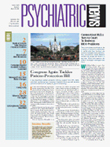Suppose a person “coming down” with schizophrenia received one of the drugs that is used to treat the disease. And suppose that drug delayed the onset of schizophrenia or even prevented it altogether. If so, the outcome would be revolutionary.
This intervention tactic is more than hypothetical, Psychiatric News has learned. It is being explored in a scientific study headed by Thomas McGlashan, M.D., a professor of psychiatry at Yale University School of Medicine.
What McGlashan and his colleagues are doing, essentially, is zeroing in on some people who appear to have very early symptoms of schizophrenia but who do not yet meet DSM-IV criteria for the disorder. These signs could include, for example, suspiciousness about people; hearing noises that are not there, although not full-blown auditory hallucinations; and speech that is rambling or disorganized, which was not previously the case with this person.
These people are receiving either an atypical neuroleptic or a placebo as part of a double-blind, randomized trial. The aim, McGlashan explained to Psychiatric News, is “to see if we can actually not only treat the symptoms that people have, but also whether we can delay or prevent the onset of psychosis.” He should have results in two years, he said.
If the results turn out to be positive, they would have widespread ramifications for the treatment of schizophrenia. Specifically, persons at risk might be given drugs at the earliest signs of schizophrenia, and those drugs would then delay disease development or even keep it at bay altogether.
And if treatment at such an early stage turns out to be efficacious, it would, of course, also behoove scientists to try to determine the earliest possible signs of schizophrenia so that drug intervention could be started at that point.
In fact, one scientist is already doing so. He is German psychologist Rheinhard Mass, Ph.D., of the University Hospital Eppendorf in Hamburg.
Mass gave a questionnaire for self-assessment of disturbances in several cognitive-perceptual areas to 308 subjects: 45 first-episode schizophrenia patients, 45 negative-syndrome schizophrenia patients, 24 remitted schizophrenia subjects, 43 depressive patients, 46 obsessive-compulsive disorder patients, 48 alcoholic patients, and 57 persons with no psychiatric disorder. He also performed some neuropsychological tests on the subjects to measure possible attention dysfunction.
By comparing results from the different groups of patients, he hoped to determine which symptoms might discriminate individuals who are developing schizophrenia from those getting other psychiatric disorders, thus pointing to early-warning signs of impending schizophrenia.
And as he reports in the latest Schizophrenia Bulletin (Vol. 26, No. 4), he may have found two early-warning indicators of the disease. They are difficulty paying attention and difficulty understanding speech.
His results, he hopes, will “contribute to the refinement of the measurement of prepsychotic signs, thus facilitating the development of early intervention approaches.”
Indeed, “difficulty understanding others” is one of the symptoms expressed by people in his study, McGlashan said. However, McGlashan was unable to comment on Mass’s study because he had not yet reviewed it.
John Docherty, M.D., of Joan and Sanford I. Weill Medical College at Cornell University, a psychiatrist who has conducted studies on what symptoms or signs come first in schizophrenia, told Psychiatric News, “I think this area of research is very important.
He added, however, that Mass’s study did not strike him “as the best research” on the subject. The reason, he explained, is that Mass categorized patients with different kinds of psychiatric disorders, did a cross-sectional analysis of them, and then compared their symptoms, yet no matter what psychiatric disorder category patients are put in, their symptoms are always fluctuating. In other words, Docherty said, what Mass essentially did was to compare the symptoms that different categories of patients were experiencing at a particular time point, which would not necessarily be the same symptoms they might experience at another time point.
In any event, regardless of which symptoms emerge first in schizophrenia, the concept of treating people with drugs for a disease they do not yet have is unusual in psychiatry and controversial. But McGlashan is not the only psychiatric scientist exploring this tact. Some bipolar disorder and Alzheimer’s disease investigators are trying it as well (Psychiatric News, May 5 and September 1, 2000). ▪
